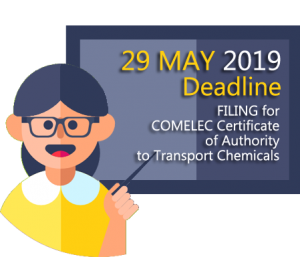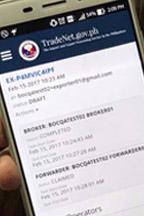Exporters and manufacturers are urged by the Strategic Trade Management Office (STMO) to conduct risk assessment of their products that may be of dual-use goods, otherwise known as strategic goods.
Dual-use goods are items, software, or technology which can be used for both civil and military end-use. These goods are listed in the National Strategic Goods List (NSGL). Other types of strategic goods are military goods and nationally controlled goods.
Strategic goods is defined by the Strategic Trade Management Act (STMA) as “products that for security reasons or due to international agreements, are considered to be of such military importance that their export is either prohibited altogether or subject to specific conditions”. These products are “generally suitable to be used for military purposes or for the production of WMD (Weapons of Mass Destruction)”.
To determine if the goods are of dual-use, exporters may refer to the NSGL, ask the product manufacturer or request classification from the STMO.
Exporters of dual-use goods are required to register and secure an exporter authorization or license from the STMO. Registration of exporters, as announced by the STMO in a forum, will be in the last quarter of 2019, while the exporter authorization is scheduled to be implemented in the third quarter of 2020.
The STMO, a bureau under the Department of Trade and Industry, is mandated by the STMA to regulate such goods by issuing “authorization/ licenses for the export, import, re-export, transit, transshipment, and provision of related services such as brokering, transporting, financing and providing technical assistance of strategic goods”.
Also covered by the STMA are the transit, transshipment, re-export, import, and reassignment of strategic goods. The schedule of regulating such activities is still to be announced by the STMO.
Non-compliance of the Act by the exporters will risk them seizure, delays, fines, imprisonment and inclusion in the denials list/ watchlist.
The STMA, otherwise known as Republic Act No. 10697, “An Act Preventing the Proliferation of Weapons of Mass Destruction by Managing the Trade in Strategic Goods, the Provision of Related Services, and for Other Purposes,” was enacted to enforce measures to establish domestic controls to prevent the proliferation of weapons of mass destruction (WMD) and their means of delivery from or within the Philippines. (ARB)
 The Bureau of Customs (BOC) temporarily suspends the Automated Bonds Management System (ABMS) implementation on transit shipments under CMO 30-2020 from 15 March 2021 up to 04 April 2021.
The Bureau of Customs (BOC) temporarily suspends the Automated Bonds Management System (ABMS) implementation on transit shipments under CMO 30-2020 from 15 March 2021 up to 04 April 2021.
 The Anti-Red Tape Authority (ARTA) directs the mandatory onboarding of the 73 Trade Regulatory Government Agencies (TRGAs) to the TradeNet through the issuance of Memorandum Circular (MC) 2021-01 last 05 March 2021. TradeNet is an online platform that harmonizes all licenses and permits for imports and exports.
The Anti-Red Tape Authority (ARTA) directs the mandatory onboarding of the 73 Trade Regulatory Government Agencies (TRGAs) to the TradeNet through the issuance of Memorandum Circular (MC) 2021-01 last 05 March 2021. TradeNet is an online platform that harmonizes all licenses and permits for imports and exports.

 EDC lauds the pronouncement made by the Bureau of Customs (BOC) AOCG Deputy Commissioner Edward Dy Buco that stakeholders can expect enhanced trade facilitation with the Bureau in 2021. He added that the Commissioner assures its support towards export growth by prioritizing export-related activities in the Bureau’s 10-Point Priority Program for the upcoming year.
EDC lauds the pronouncement made by the Bureau of Customs (BOC) AOCG Deputy Commissioner Edward Dy Buco that stakeholders can expect enhanced trade facilitation with the Bureau in 2021. He added that the Commissioner assures its support towards export growth by prioritizing export-related activities in the Bureau’s 10-Point Priority Program for the upcoming year. The Philippines can now exchange electronic Certificate of Origin (e-CO) with Indonesia and Malaysia as it joins ASEAN Single Window (ASW) Live Operation on 30
The Philippines can now exchange electronic Certificate of Origin (e-CO) with Indonesia and Malaysia as it joins ASEAN Single Window (ASW) Live Operation on 30 

 the TradeNet system and attach all documentary requirements by uploading it to the system. If approved, the exporters will receive an email containing a downloadable and printable file for the e-CO. Otherwise, the Exporter/s will be informed of the reason for disapproval through email and may file another application for e-CO.Since the full electronic sharing of e-CO among AMS is not yet operational and while the AMS are addressing all technical failures, “the Exporter shall download then print the e-ATIGA Form D, place his or her signature in the appropriate space, and submit the system-generated ATIGA Form D to the Bureau (BOC) for manual execution of signature and seal”.
the TradeNet system and attach all documentary requirements by uploading it to the system. If approved, the exporters will receive an email containing a downloadable and printable file for the e-CO. Otherwise, the Exporter/s will be informed of the reason for disapproval through email and may file another application for e-CO.Since the full electronic sharing of e-CO among AMS is not yet operational and while the AMS are addressing all technical failures, “the Exporter shall download then print the e-ATIGA Form D, place his or her signature in the appropriate space, and submit the system-generated ATIGA Form D to the Bureau (BOC) for manual execution of signature and seal”.